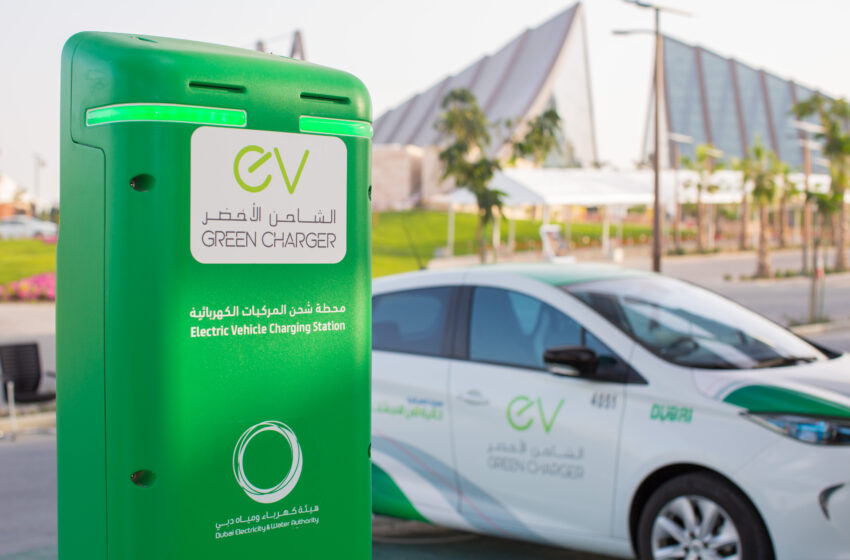
globalbizmag.com
DEWA to Expand EV Charging Stations in Dubai by 2025
The UAE, which will be hosting COP 28 in November this year, has taken several initiatives in showcasing the country’s commitment to achieve net zero emissions by 2050. One such move has been encouraging the use of electric vehicles (EVs) in the Emirate.
Since EV users need to recharge their vehicles, Dubai Electricity and Water Authority (DEWA), which is steering the Emirate’s clean energy transition by taking up energy saving programmes, has set up 370 EV charging stations across Dubai.
Now it aims to grow the city’s network of public charging stations by 170% in less than three years. By 2025, EV Green Charging Stations in Dubai will increase from the current 370, with more than 680 charging points, to 1,000 Green Charging Stations.
Dubai’s electric mobility plans represent a key pillar of the strategy to implement the vision of H H Sheikh Mohammed bin Rashid Al Maktoum, Vice President and Prime Minister of the UAE and Ruler of Dubai, to transform Dubai into a global green-economy hub.
The Emirate’s Clean Energy Strategy 2050 and Net Zero Carbon Emissions Strategy 2050 seek to generate 100% of its power from clean energy sources by that year. Furthermore, Dubai’s Roads and Transport Authority (RTA) has rolled out a long-term strategy to migrate towards net-zero emission public transport by 2050.
In fact, Dubai’s move to green mobility received a strong boost when DEWA launched its EV Green Charger Initiative in 2015 as part of its Green Mobility Strategy 2030. The number of EV owners registered under the initiative has increased from a mere 14 in 2015 to more than 11,000 by the end of May 2023. The figure is expected to double soon. By 2030, Dubai aims to have over 42,000 electric cars on its roads.
Managing Director and CEO of DEWA, Saeed Mohammed Al Tayer, said that Dubai recognised the importance of green mobility is the future of transportation. Together with other Dubai entities and key stakeholders, DEWA has drawn out a strategic blueprint that reimagines the future of urban transportation in the Emirate.
“As part of this plan, DEWA is working to create an accessible world-class infrastructure to advance the adoption of eco-friendly transportation. By encouraging electric vehicle usage, DEWA’s EV Green Charger Initiative contributes not only to carbon emissions reduction but also fosters sustainable practices throughout Dubai,” he said.
EV Demand to Grow
The demand for EVs in the UAE is projected to grow at a compound annual rate of 30% between 2022 and 2028, according to the Global Electric Mobility Readiness Index published last year. The report Index ranked the country eighth globally in terms of electric mobility readiness.
To cater to the growing demand for EV charging infrastructure, DEWA has currently deployed over 370 charging stations across Dubai. The stations offer a range of charging options, including ultra-fast chargers, fast chargers, direct current chargers, public parking chargers and wall chargers.
The stations are available round the clock at key locations such as fuel stations and public parks in addition to those located at DEWA’s customer happiness centres and shopping centres, which operate during their respective opening hours.
DEWA’s EV Green Chargers have provided 13,264 MWh of electricity from 2015 to the end of 2022, powering a cumulative electric vehicle distance of over 66.3 million kilometres. By the end of 2022, the stations recorded over 720,000 charging sessions conducted by 9,653 registered electric vehicles.
These efforts have also resulted in the reduction of 236,700 tonnes of carbon emissions as of April 2023, a testament to the growing success of its clean energy strategy.
DEWA offers a simple and hassle-free process for obtaining the EV Green Charger card needed to use EV charging stations. To get a card, users need to first create an EV account either through the DEWA website (www.dewa.gov.ae), DEWA’s smart app or its customer care centre.
DEWA provides a user-friendly EV Green Charger Dashboard to help customers better manage their charger services. The dashboard enables customers to easily make payments, track their charging and consumption data and locate the nearest charging station. All customers, including unregistered ones, can also use the guest mode feature to charge their EVs.















